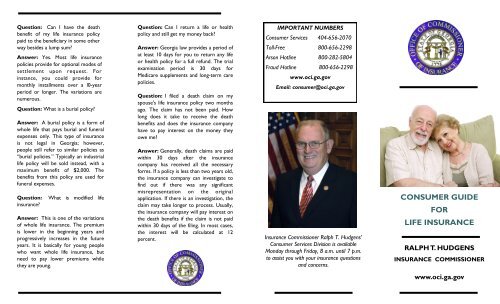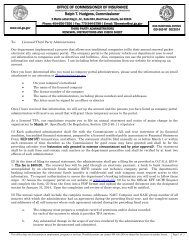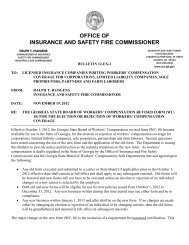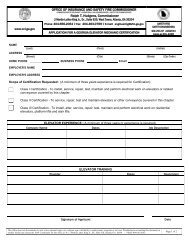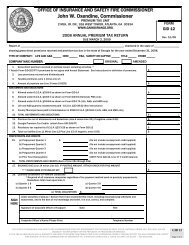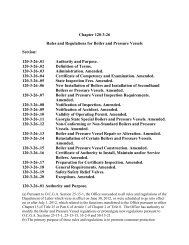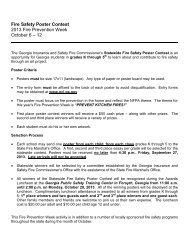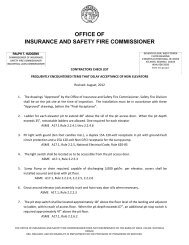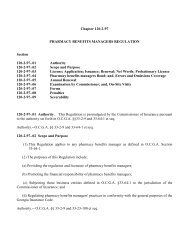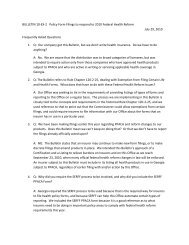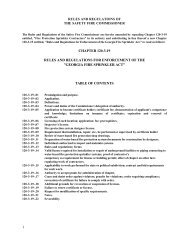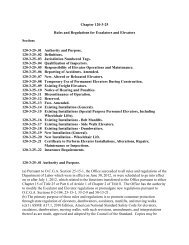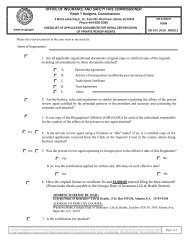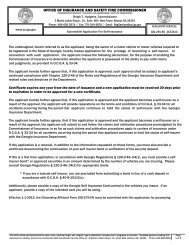CONSUMER GUIDE FOR LIFE INSURANCE
CONSUMER GUIDE FOR LIFE INSURANCE
CONSUMER GUIDE FOR LIFE INSURANCE
You also want an ePaper? Increase the reach of your titles
YUMPU automatically turns print PDFs into web optimized ePapers that Google loves.
Question: Can I have the death<br />
benefit of my life insurance policy<br />
paid to the beneficiary in some other<br />
way besides a lump sum?<br />
Answer: Yes. Most life insurance<br />
policies provide for optional modes of<br />
settlement upon request. For<br />
instance, you could provide for<br />
monthly installments over a l0-year<br />
period or longer. The variations are<br />
numerous.<br />
Question: What is a burial policy?<br />
Answer: A burial policy is a form of<br />
whole life that pays burial and funeral<br />
expenses only. This type of insurance<br />
is not legal in Georgia; however,<br />
people still refer to similar policies as<br />
“burial policies.” Typically an industrial<br />
life policy will be sold instead, with a<br />
maximum benefit of $2,000. The<br />
benefits from this policy are used for<br />
funeral expenses.<br />
Question:<br />
insurance?<br />
What is modified life<br />
Answer: This is one of the variations<br />
of whole life insurance. The premium<br />
is lower in the beginning years and<br />
progressively increases in the future<br />
years. It is basically for young people<br />
who want whole life insurance, but<br />
need to pay lower premiums while<br />
they are young.<br />
Question: Can I return a life or health<br />
policy and still get my money back?<br />
Answer: Georgia law provides a period of<br />
at least 10 days for you to return any life<br />
or health policy for a full refund. The trial<br />
examination period is 30 days for<br />
Medicare supplements and long-term care<br />
policies.<br />
Question: I filed a death claim on my<br />
spouse's life insurance policy two months<br />
ago. The claim has not been paid. How<br />
long does it take to receive the death<br />
benefits and does the insurance company<br />
have to pay interest on the money they<br />
owe me?<br />
Answer: Generally, death claims are paid<br />
within 30 days after the insurance<br />
company has received all the necessary<br />
forms. If a policy is less than two years old,<br />
the insurance company can investigate to<br />
find out if there was any significant<br />
misrepresentation on the original<br />
application. If there is an investigation, the<br />
claim may take longer to process. Usually,<br />
the insurance company will pay interest on<br />
the death benefits if the claim is not paid<br />
within 30 days of the filing. In most cases,<br />
the interest will be calculated at 12<br />
percent.<br />
IMPORTANT NUMBERS<br />
Consumer Services 404-656-2070<br />
Toll-Free 800-656-2298<br />
Arson Hotline 800-282-5804<br />
Fraud Hotline 800-656-2298<br />
www.oci.ga.gov<br />
Email: consumer@oci.ga.gov<br />
Insurance Commissioner Ralph T. Hudgens’<br />
Consumer Services Division is available<br />
Monday through Friday, 8 a.m. until 7 p.m.<br />
to assist you with your insurance questions<br />
and concerns.<br />
<strong>CONSUMER</strong> <strong>GUIDE</strong><br />
<strong>FOR</strong><br />
<strong>LIFE</strong> <strong>INSURANCE</strong><br />
RALPH T. HUDGENS<br />
<strong>INSURANCE</strong> COMMISSIONER<br />
www.oci.ga.gov
<strong>LIFE</strong> <strong>INSURANCE</strong><br />
Question: How is term life different from<br />
whole life? What types of policies are available?<br />
Answer: Whole life insurance builds cash<br />
value, has a level death benefit, a level premium<br />
and may be kept in force until the insured<br />
dies.<br />
A term life insurance policy is only in force<br />
for a specific period. It does not build cash<br />
value; the only value is the death benefit. A<br />
term policy should be renewable and convertible<br />
(to whole life), though many companies<br />
will not convert past the age of 60. Term is<br />
useful for people who need a large amount of<br />
coverage for a short period of time, such as<br />
home buyers and parents of young children.<br />
With a decreasing term policy, also known as<br />
mortgage cancellation insurance, the face<br />
amount begins at a certain amount and decreases<br />
at a regular rate over the term of the<br />
policy until it is zero. The purpose of this type<br />
of policy is to protect the policyholder's<br />
mortgage or similar obligation that is being<br />
paid in installments over a fixed period.<br />
Increasing term life insurance acts in the reverse;<br />
its value increases over time. It may be<br />
purchased to protect a business that becomes<br />
more valuable through the years.<br />
With level term, the same premium is paid on<br />
a regular basis until the policy ceases to have<br />
value.<br />
Question: What is universal life insurance?<br />
Answer: Universal life is a combined form of<br />
whole life and annual renewable term insurance and<br />
is interest-sensitive. In other words, the cash value<br />
varies according to the economy: how the insurance<br />
company performs with its investments affects<br />
the value of a universal life policy. Also, the policyholder<br />
can vary the amount of premiums paid, as<br />
well as the date of payment, subject to policy minimums.<br />
The amount of coverage can be lowered<br />
throughout the life of the contract without proof of<br />
insurability, or raised with proof.<br />
Question: Can an insurance company place limits<br />
on life insurance?<br />
Answer: Policy limits are determined by the insurance<br />
company, and are generally based on what the<br />
company determines is the legitimate need for an<br />
applicant. Most companies will not sell a policy with<br />
a limit of less than $1,000.<br />
Question: If I buy a term life insurance policy now,<br />
can I exchange it for a permanent plan later, such as<br />
whole life?<br />
Answer: Most insurance companies provide a provision<br />
of exchange or conversion from term to permanent<br />
insurance. Generally the change is simple;<br />
the policyholder does not have to provide evidence<br />
of insurability at the time of conversion.<br />
Question: I have a whole life insurance policy and<br />
need to borrow some money from it. How much<br />
can I borrow?<br />
Answer: Most policies have a positive cash value<br />
after three years. Your insurance policy contains a<br />
Table of Values showing the current cash value at<br />
any given period. You can borrow the full amount<br />
of the current cash value less the interest.<br />
Question: Can my life insurance policy be used as<br />
collateral for a loan?<br />
Answer: Lending institutions will generally accept<br />
assignment of a life policy as all or part of collateral<br />
for a loan.<br />
Question: I recently was approved for a loan to<br />
purchase a used car. Since I'm 26 years old, do I<br />
really need credit life insurance?<br />
Answer: If you are healthy and already have adequate<br />
life insurance, you may not need credit life.<br />
Question: Do I have to buy credit life insurance in<br />
order to get a loan?<br />
Answer: A creditor can require credit life insurance<br />
as additional security for a loan. However by<br />
notifying the creditor in writing, you can substitute<br />
an existing policy owned or controlled by you, or<br />
you can secure and furnish the coverage through<br />
any licensed insurer within this state.<br />
Question: I have a $3,000 loan which came with<br />
credit life insurance, I've paid off $2,000 of the loan.<br />
Why does my credit life insurance stay at a coverage<br />
level of $3,000?<br />
Answer: The type of credit life insurance you purchased<br />
is called level term insurance. The amount of<br />
insurance remains level or unchanged, for the duration<br />
of the loan term. If you buy “decreasing" term<br />
insurance, the amount of the insurance decreases as<br />
the loan balance decreases.<br />
Question: Once your term insurance policy has<br />
ended, can you renew your policy?<br />
Answer: Your coverage can be continued<br />
for another term if you have a renewable<br />
policy. If you renew the policy, the premiums<br />
will be higher because you are older,<br />
but you will not have to provide evidence of<br />
insurability to renew the policy.<br />
Question: If a person has a whole life policy<br />
with a certain cash value, can the person<br />
borrow money from the insurance company<br />
that wrote the whole life policy?<br />
Answer: A person can borrow from the<br />
insurance company up to the current cash<br />
value by using the policy as collateral. If the<br />
loan has not been paid off by the borrower's<br />
time of death, the amount owed plus interest<br />
will be deducted from proceeds paid to<br />
the borrower's beneficiary.


